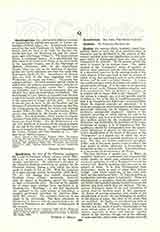

Quality (Gr. poiotes—Plato, Aristotle—poion; Lat. qualitas, quale) is used, 1st, in an extended sense, as whatever can be attributed to the subject of discourse; and 2nd, in its exact signification, as that category which is distinguished from the nine others enumerated by Aristotle. In the present article the word is treated in its stricter sense. The eighth chapter of the “Categories” treats of quality, as distinct from substance and the other predicaments. It is described, however, in the opening words of the sixth chapter of the same book as that on account of which we say that anything is such or such —poioteta de lego, kath en poioi tines [einai] legontai. It is thus the accidental form which determines the subject to a special mode of being. It is the reply to the question Qualls sit res?, as St. Thomas Aquinas remarks; and is the correlative to Talis (as Quantus to Tantus), as is pointed out by James Mill in his “Analysis“. As the notion is a simple one, it is not possible strictly to define it; for, to do this, it would be necessary to split it up into genus and differentia—an impossibility where the simplest concepts are concerned. It is itself not a real genus, since many particular things, not generically identical, can be subjects of the same predicate, analogically employed. Quality is the category according to which objects are said to be like or unlike; and, in view of the tendency introduced into modern science by the mechanist theories of Descartes, and fostered by the postulate of the transformation of energy, it is of importance that the qualitative should be distinguished from the quantitative differences of objects (cf. Quantity). Aristotle‘s classification of the heads of discourse in the “Categories” is a logical one, in which the attributes are considered as possible predicates of a subject. But they are further understood metaphysically; and, in this sense, quality is one or other of the four modes in which substance is determined to being talis or talis, i.e. such or such. Considered thus, it is an accidental determination (cf. Form).
The four divisions of quality are: (I) Habit or condition (habitus); a permanent and comparatively stable quality by which man, considered as to his nature or operation, is well or ill-adapted towards his natural end. Strictly speaking, only man can be the subject of habit. It is thus distinguished from disposition; which is used of other than human beings. Less stable conditions, as hot, cold, sick, well, are also mentioned here. (2) Natural powers or incapacities (potentia activa et impotentia). These are distinguished, as accidents, from the substance; and are further distinguished among themselves as are the distinct acts from which they are inferred. The important Scholastic thesis of the real distinction of nature from its faculties arises in this connection. (3) Power of causing sensations and results of the modification of sense; the one belonging, as quality, to the objects of sense; the other to the senses that are modified. (4) Figure, or circumscribing form of extended bodies. St. Thomas Aquinas insists upon the fact that this mode of quality (morphology) is the most certain index of the identity or diversity of species, especially in plants and animals. Quality admits in the concrete, though not in the abstract, of more and less; and in some cases, though not in all of contrariety. A figure cannot be more or less triangular than another, though one man may be more wise than another; and there is no contrary to red; though just is contrary to unjust. The category, in its predicamental sense, involves that of relation, as is noted by Aristotle. The answer to Qualis? asked of the concrete man, is talis—such as so-and-so. Metaphysically considered, no relation of this kind need be involved. The substance, or nature, is tails because of the accidental form that determines it absolutely, without reference to any standard of comparison.
FRANCIS AVELING

